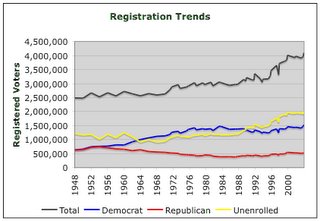In this Sunday's Ideas section of the Globe, there was an article on Independent voters in Massachusetts, and the prospects of a Christy Mihos independent gubernatorial run. Now, I pointed out last year that Massachusetts was purple in gubernatorial elections, but I'm not sure if the results of those contests prove much about the temperament of Massachusetts independents. While these unenrolled voters may swing to the moderate Republican when voting for governor, they decisively swing toward the Democrat in nearly every other case. Non-gubernatorial statewide positions are all held by Democrats, as is 100% of the seats in Congress and a supermajority of the Legislature. I'm also not sure that this is a function of ideology, either. Republicans must be moderate, or at least fake it, to get elected, Democrats in the State House run the gamut from conservative to ultra-liberal.
So, if we assume that unenrolled voters do not prefer Democrats for non-gubernatorial elections, can we explain the results of those elections? Certainly the complete dominance of Democrats at all other levels cannot be a result of random chance. I can think of two factors that might help explain this. First, the power of incumbency might give Democrats an advantage; a Democratic majority could just be self-perpetuating. But if that were the case, one would imagine that non-Democrats would do measurably better in open-seat races. I haven't looked at all the data, but the results from the past two years -- 2004 legislature elections and the special elections since then -- seem to indicate that this is not the case. Second, the gerrymandering of Massachusetts on both the state and Federal level may have tilted the playing field so much that it's nearly impossible for a non-Democrat to win an election. There are two problems with this explanation, one that it does not apply to statewide elections, particularly the Constitutional officers which are now all Democrats except for the governor and lieutenant governor. Also, given the number of unenrolled voters it seems unlikely to me that so many of the districts could be gerrymandered to such an extent that Democrats have an insurmountable advantage in every one. Of course, without looking at the data, I can't say this for sure.
What does all this mean for Christy Mihos, should he run as an Independent? Frankly, not much, because the gubernatorial election seems to be the exception to the Democratic tendencies of unenrolled voters. This may be, as many posit, because people want a check on the Democratic legislature, which they fear will raise their taxes. I'm not convinced, however, that this makes sense since they vote in that same legislature year after year, even though they're apparently terrified of a tax increase. If I had to ascribe this to one factor, I would say that it was the publicity of the gubernatorial contest more than anything else. People are more likely to vote for the person over the party when they know what that person stands for. They're more likely to use the party as a cue when they know little about the race. Since the governor's race is all over the papers and the television, voters are more likely to know the issues and the personalities involved. That's not true of legislature races, where one has to make a real effort to find any specific positions, or even who the candidates are. It seems to me that it's in these low-profile races where unenrolled voters show their partisan preferences, since it shows how they would vote if the only difference they're aware of between the candidates is the party.
We can assume that Christy Mihos, should he run as an Independent, he will spend enough money so that voters will know who he is. In that way, it's very hard to compare his candidacy to other unenrolled and third party candidates. Generally, those candidates spend little money, don't get on television and tend to get less than 5% of the vote. The only comparable race I could think of, where a high-profile Independent challenged both a Democrat and a Republican statewide is the 1992 presidential election, where Ross Perot ran as a high profile third-party candidate. The 1996 election was similar, but at that point Perot was seen as a less credible candidate given his failure to win a single state in '92. Here are the results from 1992 in Massachusetts:
| 47.5% | Clinton |
| 29.0% | Bush |
| 22.7% | Perot |
Getting back to the unenrolled voters, the Secretary of the Commonwealth has the historical enrollment trends. Here they are in graph form:

The chart shows that while the percentage of Democrats may have decreased, the actual number of registered Democrats has held relatively steady over the past thirty or so years, and has been trending upward over the past ten. What's changed is that the the total number of registered voters is spiking upward -- something that I take as a good sign for democracy. The decrease in the percentage of registered Democrats seems to be because more of these new voters are not choosing to enroll in a party, and not because of a mass exodus of people from the Democratic party. What this suggests to me is that the Dems need to do a better job of outreach to new voters.
Thanks to The Intergalactic Jester for pointing out the article.







|